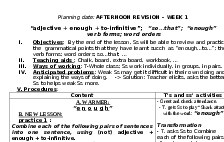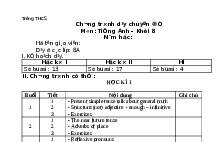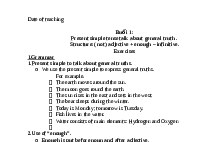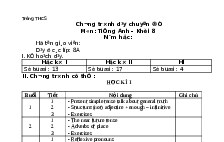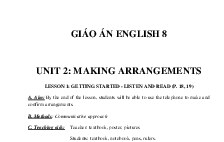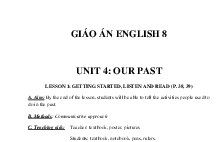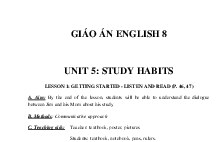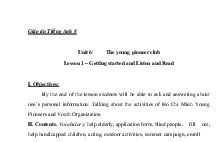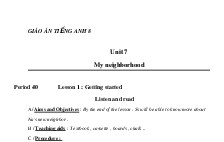Giáo án chuyên đề Anh 8 mới
Nội dung tài liệu
Tải xuống
Link tài liệu:
Các tài liệu liên quan
-
![GIÁO ÁN DẠY THÊM TA 8.]()
-
![Giáo án chuyên đề Anh 8 mới]()
-
![Giáo án dạy thêm Anh 8 mới]()
-
![Giáo án chuyên đề Anh 8 mới]()
-
![Giáo án Tiếng Anh 8 Unit 2: Making arrangements]()
-
![Giáo án Tiếng Anh 8 Unit 3: At home]()
-
![Giáo án Tiếng Anh 8 Unit 4: Our past]()
-
![Giáo án Tiếng Anh 8 Unit 5: Study habits]()
-
![Giáo án Tiếng Anh 8 Unit 6: The young pioneers club]()
-
![Giáo án Tiếng Anh 8 Unit 7: My neighborhood]()
Có thể bạn quan tâm
Thông tin tài liệu
Tr êng THCS Ch ¬ng tr×nh d¹y chuyªn ®ÒM«n: TiÕng Anh Khèi N¨m häc: Hä tªn gi¸o viªn: D¹y c¸c líp: 8AI. KÕ ho¹ch d¹y.Häc k× Häc k× II HÌSè buæi 13 Sè buæi 17 Sè buæi 4II. Ch ¬ng tr×nh cô thÓ :H KÌ IỌBu iổ Ti tế dungộ Ghi chú1 123 Present simple tense talk about general truth- Structure:(not) adjectire enough infinitive- Exercises2 123 The near future tense- Adverbs of place- Exercises3 123 Reflexive pronouns- Preposition of time- Exercises4 123 Past simple tense- Structure: Used to with the past simple tense.- Exercises5 123 Modals verbs: Must, have to, ought to- Adverbs of manner.- Exercises6 123 Commands, requests and advice in reported speech- Exercises7 123 Commands, requests and advice in reported speech- Exercises8 123 Imperatives Present simple tense with future meaning- Exercises9 123 Gerunds- Modal: may/ can/ could- Exercises10 1-2-3 Present perfect tense with "for and since"- Exercises11 Comparison: Like, (not) as…as, (not) the23 same as, different from Exercises12 123 Present progressive: -to talk about the future-to show changes with “get” and “become”- Exercises13 123 Comparative and Superlative adjectives.- Exercises- ExercisesH KÌ IIỌ14 123 In order to ,so as to The future tense Modal "Will"- Exercises15 123 Passive form with past simple- Exercises- Exercises16 123 Passive form with present simple- Exercises- Exercises17 123 Adjiectives followed by -an infinitive -a noun clause Exercises18 123 ED and ING participles- Written test- Exercises19 123 Requests with: Would/ Do you mind if…? Would/ Do you mind V(ing)?- Exercises20 123 Passive form with the present perfect- Exercises- Exercises21 123 To make requests, offer, promises- Passive form with future simple- Exercises22 123 Past Progressive tense- Exercises- Exercises23 123 Passive from( tobe past participle)- Exercises- Exercises24 Reported speech (T1)23 Exercises- Exercises25 123 Reported speech( T2)- Exercises- Exercises26 123 Indirect questions with “if” and “whether”- Exercises- Exercises27 123 Question words before a" to infinitive"- Compound words- Exercises28 123 Comparision of present perfect and past simple- Written test29 123 Passive form with the progressive tenses.- Exercises- Exercises30 123 Pronunciation- Exercises- ExercisesHÈ1 123 Tenses: Simple, past, and progressive tenses- Exercises- Exercises2 123 Tenses: Present perfect and future tenses- Exercises- Exercises3 123 Some structures- Exercises- Exercises4 123 Some structures- Exercises- ExercisesTeaching:....../......./ Bu 1PRESENT SIMPLE TENSE TALK ABOUT GENERAL TRUTHSTRUCTURE: (NOT) ADJECTIVE ENOUGH INFINITIVEEXERCISESA. GRAMMAR.I. Present simple tense.1. Form.Affirmative Negative QuestionsI/you/we/they talkHe/she/it talks I/you/we/they do not/don't talkHe/she/it does not/doesn't talk Do I/you/we/they talk ?Does he/she/it talk ?* Quy thêm (s/ es) sau ng ngôi th ít.ộ ố- Thêm sau các ng :ộ ừTo live -> live To work -> work s- ng cùng ng (o, x, ss, sh, ch es)ộ ằTo miss -> miss es To wash -> wash es- ng cùng ng ph âm y: -> esụTo study -> stud ies+ ng cùng ng nguyên âm (a, e, ho u) thì ch thêm S.ặ ỉTo play -> play To enjoy -> enjoy s2. Cách dùng.Thì hi đơ gi dùng ch :ả ỉ- Nh ng hành ng nhi (thói quen, thú tiêu khi n)ọ ểEx. He usually gets up early.- Nh ng tình hu ng lâu dài:ữ ốEx. He works in factory.- th lâu dài ho các quy lu nhiên:ự ựEx. The earth travels round the sun.- Thì này th ng đư dùng i:ợ ớ+ Tr ng ch xu t: always, usually, often, sometimes, seldom, rarely, never.ạ ấ*l Tr ng ch xu ng sau To BE nhứ ng ng trứ ng thộ ng.ờEx. He usually drinks tea. He is sometimes late.- On monday, on Fridays, every day, every week, once week, twice month....II. Too/ Enough.1. Enough bao hàm nghĩa xác nh.ịEx. She isn't old enough to be in my class. He ran fast enough to catch the train. The story is interesting enough for the children to listen to.Adj/ Adv Enough to-infinitiveAdj/ Adv Enough for sb to-infinitive2. Too (quá) hàm ph nhị ch vỉ quá quy nh. Too ng trứ ộtính hay phó ph nghĩa cho ó.Ex. My grandfather is too old to work. She spoke too softly to hear. This coffee is too strong for me to drink.III. Past simple tense.1. Form:Affirmative Negative QuestionsS V(ed/2) ....(worked) didn't V-infi... Did V-infi...*Quy thêm ed sau ng có quy c:ộ ắ- các ng edộ ừTo walk -> walked; to heat -> heated- ng cùng dộ ậTo live -> lived- ng cùng ng nguyên âm ph âm (tr x, y, w) ôi ph âm ụcu ed.ốTo stop -> stopped*l to play -> played- ươ ng nhự trên ng nhi âm ti t:ộ ếTo prefer -> preferred (nh âm ti cu i)ấ ốNh ng: To listen -> listened- ng quy trong ti ng anh không đư thêm ED nên ngợ ph ọthu lòng.ộTo come -> came; begin -> began2. Cách dùng:- Thì quá kh đơ gi dùng ch nh ng hành ng ra và thúc trong quá ếkh thứ ng vào th gian xác nh.ịEx. She moved to Singapore last week.- Thì này th ng đư dùng các tr ng th gian nhợ yesterday, ago, last, in 1999... Too Adj/ Adv to-infinitiveToo Adj/ Adv for sb to-infinitiveTeaching:....../......./ Bu 2THE NEAR FUTURE TENSEADVERBS OF PLACEEXERCISESA. Grammar I. Future with (be going to)1. Cấu tạo:Affirmative Negative QuestionsS is/are/am going to infi be not going to infi Be +S going to infi...?2. Cách dùng:- Chúng ta dùng be going to nói ho ch và nh trong tị ươ ng lai.Ex. He is going to paint the house tomorrow.- Be going to th ng đư dùng các tr ng ch tợ gian nhờ tomorrow, next, tonight, this weekend, in two days...II. Adverbs of place.- Tr ng ch nạ ch cho bi gì ra âu. Chúng th ng ng sau ứđ ng chính.ộ ừEx. Come in- Nh ng tr ng ch nữ ch là: outside, inside, here, there, upstairs, ọdownstairs.Ex. Come here !; Put it there- Nh ng tr ng ph bi khác: nearby, everywhere, over there, home...ữ ếEx. Let's go home .Teaching:....../......./ Bu 3REFLEXIVE PRONOUNSPREPOSITION OF TIMEEXERCISESA. GRAMMAR.I. Reflexive pronouns.1. ại từ phản thân gồm có:Ngôi thứ Singular PluralNgôi th nh tứ ấNgôi th haiứNgôi th baứ MyselfYourselfHimself/herself/itself OurselvesYourselvesthemselves2. Use:- ph thân di hành ng tr chính ngộ th hi n. ph ảthân có th làm:ểa. Objects.*Object of verb.Ex. Be careful! You'll cut yourself .*Object of preposition.Ex. She looks at herself in the mirror.b. Emphasis: Tr ng này ph thân còn đư là "ợ làm nh ạnghĩa"Ex. Mr Green himself took the pupils to the zoo.* ng ngay sau ch .ứ ừEx. This boy himself watered the plants.* ng cu nh câu.ềEx. This boy watered the plants himself .c. "By reflexive pronoun ." Có nghĩa làm (without help)ựex. Tom always does the homework by himself .II. Preposition of time.* IN tháng/ m/ mùa/ bu trong ngàyổEx. I'm going to Laos in January.* AT bu trong ngày/ gi ng .ồ ễEx. at six pm* ON th trong tu n/ th -bu i/ ngày tháng/ ngày bi t.ặ ệEx. I'll see you on Wednesday.* AFTER tr hễ cái gì.Ex. after pm* BEFORE hớ cái gì.Ex. before pm* BETWEEN th gian gi hai m.ểEx. betwwen am and amTeaching:....../......./ Bu 4PAST SIMPLE TENSESTRUCTURE: USED TO WITH THE PAST SIMPLE TENSE.EXERCISESA. GRAMMAR.1. Used to ng): ừ- Di thói quen trong quá kh mà nay không còn.ễ ứEx. He used to play tennis. Her father used to be school teacher.2. Question and negative form.a. Question form:Ex. Did your father use to drink tea in the morning? Where did you use to travel ?b. Negative form:Ex. His son didn't use to do exercise.3. Contrast: Used to be/ get used to.a. Used to (bare form)Ex. The village used to use oil lamps.b. Be/ get used to noun phrase/ gerund. (quen i)ớEx. Ba was born in farmer family. He is used to working in the sun. People get used to the bus delay.Teaching:....../......./ Bu MODALS VERBS: MUST, HAVE TO, OUGHT TOADVERBS OF MANNEREXERCISESA. GRAMMAR.I. Must/ have to/ ought to.1. Must (ph i)ả là khi tr ng (a modal) đư dung di :ợ ảa. bu hay thi có tính ch quan, do nghĩ ngự nói.ờ(Wh) did use to infi..S did not/ didn't use to infi..Be/ get used to noun phrase/gerundEx. He must do this exercise again.b. Tính quy hay lu t.ắ ậex. We must drive on the right.2. Have to: Di bu hay thi có tính khách quan do bên ốngoài.Ex. Your eyes are week. You have to wear glasses.3. Ought to: Di khuyên.ễ ờEx. We ought to obey our parents.II. Questions with "Why"- Câu Why đư dùng nguyên nhân hay lí do.ể ềEx. Why do they cover the electric sockets?- tr cho câu Why chúng ta có th dùng:ể* nh "Because"ề ớEx. Why do you get up early? Because want to do exercises.Teaching:....../......./ Bu 6COMMANDS, REQUESTS AND ADVICE IN REPORTED SPEECHEXERCISESI. GRAMMAR:- nói tr ti (direct speech) Th ng có ngo kép (“) khi sang nói ườ ờgián ti (reported speech) ta ngo kép.ế ặEx. Direct speech: He said to me “Stop talking” Reported speech: He told me to stop talking.- nói gián ti là nói ng thu theo riêng ng ườ ượ ườthu i, nh ng nghĩa câu không thay i)ậ ổ1. Commands, requests and advice in reported speech. Ex1. “Clean the bike” Tim said to his younger brother.-> Tim told (ordered) his younger brother to clean the bike.“Don’t open the books” The teacher said to us.-> The teacher told us not to open the books.Ex2. “Please turn on the light” My teacher said to me.-> My teacher asked me to turn on the light.“ Please don’t turn on the light” My teacher said to me.-> My teacher asked me not to turn on the light.Ex3. “You had better work hard for the exam” Tom said to his brother.-> Tom advised his brother to work hard for the exam.“ You shouldn’t go to bed late” My mother said to me.-> My mother advised me not to go to bed late.2. Cách chuy nói tr ti sang nói gián ti p.ể ế- Khi chuy câu nói nh nh, yêu và câu khuyên sang câu gián ti ta ếdùng các ng ng thu t: Told (b o), ordered (ra nh), asked (yêu u), advised ườ ầ(khuyên)3. Structures:a. Affirmative.b. Negative. Teaching:....../......./ Bu 7COMMANDS, REQUESTS AND ADVICE IN REPORTED SPEECHEXERCISESA. GRAMMAR.I. Commands, requests, and advice in reported speech.1. Reported speech.- Direct speech: nêu nguyên nói ai nói. Chúng ta dùng ngo kép ặtrong lo câu này.ạEx. He said to me "Stop talking"- Reported speech: thu nguyên ch không ph nguyên vậ n) nói ai ó. Không dùng ngo kép lo câu này.ấ ạEx. He said to me "Stop talking" (Direct speech) -> He told me to stop taling (Reported speech)2. Reported commands and requests:Ex. He said to me "Can you give her the letter?" -> He asked/ told me to give her the letter. (Please) O.S told sb to asked ordered advised Don’t O.S told sb not to asked ordered advisedS told/ asked sb (not) to-infinive


